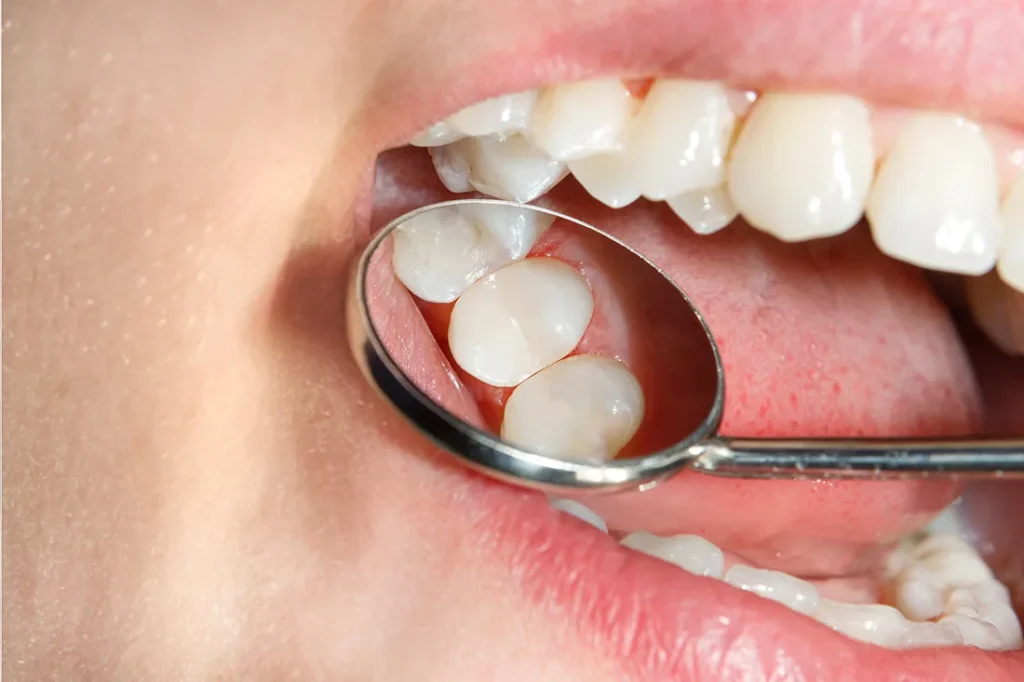
When tooth decay creates cavities in your teeth, immediate treatment becomes essential to prevent further damage and preserve your oral health. Plaque constantly forms on teeth, and when you eat or drink anything with sugar, the bacteria present in plaque create acids that attack your enamel and can form cavities over time. The good news is that modern dental fillings can restore your teeth’s function and appearance while stopping decay in its tracks.
At Naylor Family Dental and Implant Center, we understand that discovering you need a filling can feel overwhelming. Our Las Vegas dental team takes a compassionate approach to restorative care, using advanced materials and techniques to ensure your comfort during the process. Dr. Brian Naylor and our experienced staff are committed to providing high-quality dentistry while crafting treatment plans tailored to your needs and goals.
Today’s dental patients have several excellent filling options, each offering specific advantages depending on their specific situation. Composite resin fillings, also called tooth-colored fillings, have become popular due to their realistic appearance and versatility. These fillings blend seamlessly with your existing tooth structure, making them virtually invisible when you smile or speak.
Amalgam fillings, while less aesthetically pleasing, remain a durable and cost-effective option for posterior teeth where chewing forces are greatest. These silver-colored fillings have a long track record of success and can withstand significant pressure from daily use. For patients seeking premium aesthetics and longevity, ceramic and gold fillings represent top-tier options, though they typically require a larger investment.
The choice between filling materials depends on factors such as the cavity’s location, size, your budget, and aesthetic preferences. During your consultation, we’ll discuss which option best serves your individual circumstances and long-term oral health goals.
Knowing what to expect during your filling appointment helps to ease any anxiety about the process. We begin by ensuring your complete comfort through local anesthesia, which numbs the treatment area so you won’t feel any discomfort during the procedure.
Once the area is numb, Dr. Naylor carefully removes the decayed portion of your tooth using precise instruments. This step prevents further decay, ensuring the filling’s long-term success. After thoroughly cleaning the cavity, we prepare the space to receive your new filling material.
For composite fillings, we apply the tooth-colored resin in layers, using a certain light to cure each layer. This process allows us to achieve an excellent color match and proper bonding strength. The procedure usually takes 30 to 60 minutes, depending on the cavity’s size and complexity.
After placing your filling, we’ll check your bite to ensure correct alignment and make any necessary adjustments. You’ll get specific aftercare instructions to help your filling last as long as possible while maintaining optimal oral health.
Modern composite fillings offer numerous advantages that make them an excellent choice for most patients. Their most obvious benefit is their natural appearance – these fillings can be precisely matched to your tooth’s color, making them virtually undetectable to others.
Beyond aesthetics, composite fillings need less removal of healthy tooth structure compared to traditional amalgam fillings. This helps preserve more of your natural tooth, contributing to its long-term strength and stability. The material also bonds directly to your tooth, providing extra support and decreasing the risk of future fractures.
Composite fillings also offer versatility in treating both small and large cavities effectively. They can be used for cosmetic bonding applications as well, addressing minor chips, gaps, or discoloration in addition to decay removal.
These modern materials typically contain no mercury, addressing concerns some patients have about traditional amalgam fillings. With proper care, tooth-colored fillings can provide years of reliable service while maintaining their natural appearance.
Good maintenance extends your filling’s lifespan and protects your overall oral health. Routine brushing with fluoride toothpaste and daily flossing help prevent new decay from forming around your fillings. These habits also support your gums and surrounding teeth.
Avoiding habits that can damage your fillings is equally important. Hard foods like ice, nuts, and hard candies can crack or chip both your natural teeth and filling materials. Also, using your teeth as tools to open packages or bottles can cause unnecessary stress and potential damage.
Routine checkups allow us to monitor your fillings and catch any potential issues early.
During these visits, we can detect signs of wear, leakage, or new decay that might require attention. Professional cleanings also help maintain the areas around your fillings, preventing bacterial buildup that could lead to additional problems.
If you experience sensitivity, pain, or notice changes in your filling, contact our office promptly. Early intervention keeps minor issues from becoming major problems requiring more extensive treatment.
Don’t let tooth decay compromise your oral health and confidence. At Naylor Family Dental and Implant Center, we’re committed to treating you with the same care and attention we would give to our own family in our calming and supportive atmosphere. Dr. Naylor, who completed his dental education at Indiana University in 2017, brings years of experience and a gentle touch to every procedure.
We understand that quality dental care should be accessible, which is why we accept multiple insurance plans, including Delta Dental PPO, Cigna Dental, and Aetna Dental, and offer financing through CareCredit, Proceed Finance, and Cherry. New patients can take advantage of our $300 special, which includes a thorough cleaning, comprehensive exam, and x-rays. To schedule your consultation and learn more about our dental filling options, call us at (702) 395-0366 or contact us online today.
Cavities are common. Nearly 80% of Americans have had at least one before the age of 18.